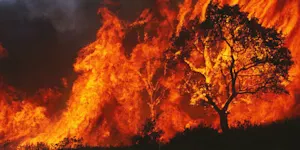What Makes This Word Tick
The word "turbulent" evokes a sense of disorder and instability. It conjures images of choppy seas and windswept days, but it can also describe societal upheaval or a difficult period in one's personal life. It's a dynamic word that suggests movement and change, often with a hint of chaos or unpredictability.
If Turbulent Were a Person…
They'd be the life of the party, though you might occasionally find yourself holding onto your hat. With a penchant for stirring things up, they'd have a knack for ensuring no two moments are ever alike. This character would walk a fine line between exciting and overwhelming, keeping everyone on their toes.
How This Word Has Changed Over Time
"Turbulent" stems from the Latin "turbulentus," meaning full of commotion. Its usage has remained fairly consistent over the centuries, primarily associated with physical or metaphorical chaos. While its use to describe rough weather has persisted, recent times have seen it applied increasingly to political and economic situations.
Old Sayings and Proverbs That Use Turbulent
Generally, folklore doesn't name words like "turbulent" directly; however, expressions about weathering storms or navigating choppy waters encapsulate its spirit. These sayings remind us of resilience and the calm that eventually follows the chaos.
Surprising Facts About Turbulent
You’ll find "turbulent" discussed in physics textbooks when dealing with fluid dynamics – a turbulent flow is a chaotic fluid motion with eddies and vortexes. Interestingly, though turbulence in flights can feel alarming, it's usually not dangerous for aircraft, merely an inconvenience for passengers.
Out and About With This Word
The arrival of autumn often prompts people to describe the shifting winds and swirling leaves as turbulent. Similarly, anyone who's sat through a bumpy plane ride may have heard a pilot advising of "turbulent air conditions." It's a word that's not shy about popping up in the great outdoors.
Pop Culture Moments Where Turbulent Was Used
Turbulent landscapes often set the backdrop for dramatic scenes in movies and TV shows, symbolizing internal or external conflict. Think of storm-tossed ships or desert sands being whipped into frenzy—always a prelude to action or revelation.
The Word in Literature
Turbulent often finds its way into novels depicting historic or personal upheaval. It helps paint a picture of times when emotions run high and events spiral out of control. Consider it a staple in the works of authors like Charles Dickens or Ernest Hemingway, whose stories often involve turbulent times.
Moments in History with Turbulent
The 1960s, a decade marked by significant cultural and political upheaval, fits perfectly with "turbulent." The Civil Rights Movement, numerous protests, and significant shifts in norms frequently used this descriptor. It captures the essence of periods when society seems in flux.
This Word Around the World
In French, "turbulent" becomes "turbulent," carrying a similar connotation of chaos. Meanwhile, in Japanese, the concept is often conveyed with phrases like "荒れた" (areta), meaning rough or stormy, often describing emotional states or weather.
Where Does It Come From?
"Turbulent" originates from the Latin word "turbulentus," which itself derives from "turba," meaning crowd or commotion. This origin underscores its connection to disorderly or chaotic situations, as a crowd often can be.
How People Misuse This Word
People occasionally use "turbulent" to describe situations that are inconvenient rather than genuinely chaotic. Remember, genuine turbulence evokes a sense of potentially dangerous or unsettling disorder, not simply the hustle and bustle of a busy day.
Words It’s Often Confused With
Tumultuous: While both suggest chaos, "tumultuous" often implies a noisier, more emotionally charged situation.
Agitated: This word suggests nervous or excited energy, which doesn’t always translate to a larger chaotic event.
Unstable: It implies a lack of stability but not necessarily the active chaos suggested by "turbulent."
Additional Synonyms and Antonyms
Synonyms: Chaotic, stormy, rough, tempestuous
Antonyms: Calm, peaceful, serene, stable
Want to Try It Out in a Sentence?
"During the turbulent storm, the ship pitched and rolled, leaving no sailor untested by the sea's fury."
















